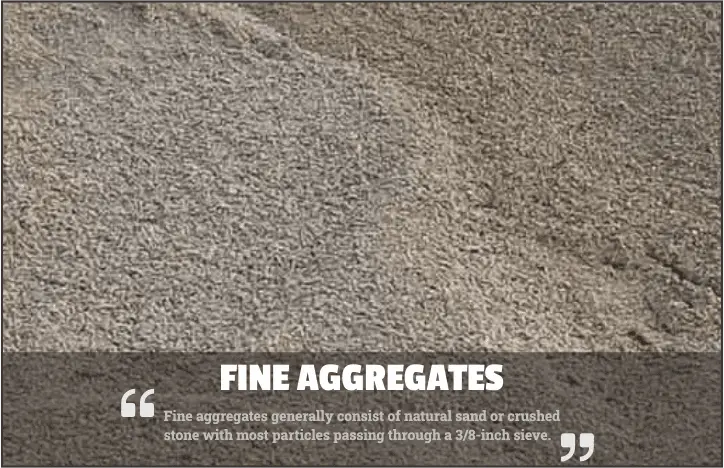Fine aggregate, also known as sand, is an essential component of concrete and other construction materials. It plays a crucial role in the overall performance and properties of these materials. The use of fine aggregate offers several benefits in construction applications. In this article, we will explore the advantages of using fine aggregate:
Workability:
Fine aggregate improves the workability of concrete and mortar mixtures. The presence of sand particles in the mix helps to lubricate the mixture, making it easier to handle, transport, and place. It enhances the cohesiveness and flowability of the mixture, allowing for better consolidation and compaction.
Cohesion and Strength:
The inclusion of fine aggregate enhances the cohesion and strength of concrete. The sand particles fill the voids between larger aggregate particles, creating a dense matrix. This improved packing leads to increased interlocking and friction between particles, resulting in higher compressive strength and overall durability of the concrete.
Water Demand and Shrinkage Control:
Fine aggregate helps control the water demand of concrete mixtures. The presence of sand particles provides a larger surface area for water to react with cement, reducing the overall water-to-cement ratio. This lowers the water demand of the mixture, leading to better strength development and reduced shrinkage upon curing.
Surface Finish and Aesthetics:
Fine aggregate contributes to the surface finish and aesthetics of concrete. When properly graded, sand can produce a smooth, uniform surface that is visually appealing. It allows for the creation of different textures and finishes, such as exposed aggregate or polished concrete, enhancing the aesthetic appeal of architectural and decorative applications.
Workability Retention:
Fine aggregate helps in retaining the workability of concrete over time. The presence of sand particles acts as a lubricant, preventing excessive loss of moisture and slump during transportation, placing, and finishing. This is particularly beneficial in large-scale construction projects where extended transportation and placement times are involved.
Thermal Insulation:
Fine aggregate provides thermal insulation properties to concrete. The air voids created by sand particles act as insulating pockets, reducing heat transfer through the material. This makes concrete with fine aggregate suitable for applications where thermal insulation is desired, such as in building envelopes or structures exposed to temperature fluctuations.
Chemical Resistance:
Fine aggregates can enhance the chemical resistance of concrete. Properly graded sand particles form a dense matrix that limits the penetration of aggressive chemicals. This is particularly important in applications where concrete is exposed to chemicals, such as wastewater treatment plants, industrial facilities, or marine structures.
Economical and Sustainable:
Fine aggregate is readily available and relatively inexpensive compared to other construction materials. Its use in concrete reduces the need for higher quantities of cement, resulting in cost savings. Additionally, the abundant availability of sand makes it a sustainable choice for construction projects, as long as it is sourced responsibly to minimize environmental impact.
Flexibility and Versatility:
Fine aggregates provides flexibility and versatility in concrete mix design. By adjusting the grading and proportions of sand, engineers and concrete producers can tailor the properties of the mixture to meet specific project requirements. This allows for the optimization of strength, workability, and other performance characteristics of the concrete.
Compatibility:
Fine aggregate is compatible with various types of cement and admixtures, allowing for a wide range of concrete mix designs. It can be used with different cementitious materials, such as Portland cement, blended cement, or specialty cements, without compromising the performance or properties of the concrete.
In conclusion, the use of fine aggregates in construction materials offers numerous benefits. It improves workability, cohesion, and strength of concrete, controls water demand and shrinkage, enhances surface finish and aesthetics, and provides thermal insulation and chemical resistance. Fine aggregate is economical, sustainable, and compatible with different cementitious materials, allowing for flexibility

